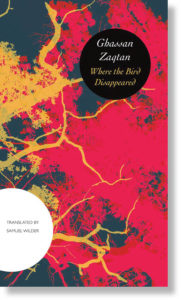By Elias Tannira
By Ghassan Zaqtan
Translated by Samuel Wilder
Seagull Books, 2018
Hardcover, 96 pages, US$19
Ghassan Zaqtan’s new book Where the Bird Disappeared is an unusual historical novel. In twenty-six chapters, the author takes the reader through layers of time that span three thousand years of history. “All times continue to exist inside the book, the pasts and the present interpenetrable.”*1 While time is nonlinear, the narrative serves neither nationalist nor anti-nationalist claims that Palestinians have failed or progressed. Instead Zaqtan “captures the pain of memory, the sorrow of life violently interrupted and the struggle to make sense of the shattered pieces of one’s past, …[telling] an intimate story about what it meant for the first wave of displaced inhabitants of Palestine to go into exile and be forced to leave the land that once they called home.”*2
The book opens in the village of Zakariyya prior to the 1948 Nakba that forced hundreds of thousands of Palestinians into the diaspora. In the village live our two main characters, Zakariyya, who shares his name with the village, and Yahya (John). These protagonists, whose personalities resemble the two biblical figures they are named after, each have their own dreams and aspirations that are cut short as a result of Zionist attacks on the village. After Yahya is beheaded in a grave accident, Zakariyya is left with the task of delivering the news to Sara, Yahya’s lover, who lives in a refugee camp, expelled from her hometown. Zakariyya travels great distances to find Sara, but when he reaches the refugee camp, he does not tell her about Yahya and heads to the Dead Sea instead, where he works in the salt mines, tormented by memories. Sixty years pass in the flip of a page, and Zakariyya eventually returns to Zakariyya where the story ties itself together to end at a satisfying conclusion, as our protagonist “was past anger, satisfaction, curiosity, fear and regret. He had arrived where nothing happens.”*3
The book mixes prose and poetry to weave a narrative rich in sensory details yet troubled by the porousness of memory. Although it takes place in a war-troubled time, it is not a book of combat and conflict. It focuses on human losses and the individual experience. For example, when the Nakba occurs, we are not there for the fighting. Instead, we turn a page and find the village “migrated.” This doesn’t mean, however, that the book doesn’t seek to represent Palestine or the Palestinian experience. It simply shows a different side.
Where the Bird Disappeared has won the 2019 Palestine Book Award Translation Prize, and Ghassan Zaqtan is the recipient of the prestigious 2013 Griffin Poetry Prize.
Published in Arabic in 2015, the book was translated into English by Samuel Wilder and published by Seagull Books in 2018.
*1 M. Lynx Qualey, “Where the Bird Disappeared – Ghassan Zaqtan,” Full Stop Reviews, available at http://www.full-stop.net/2018/10/09/reviews/marcia-lynx-qualey/where-the-bird-disappeared-ghassan-zaqtan/.
*2 Nasim Ahmed, “Where the Bird Disappeared,” Palestine Book Awards, available at https://www.palestinebookawards.com/reviews/item/where-the-bird-disappeared-2.
*3 Ghassan Zaqtan, Where the Bird Disappeared.


